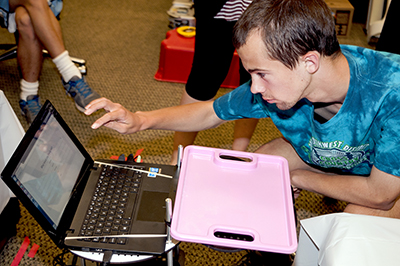Robotics

The picture most people have of a robot comes from science fiction movies. Robots are generally seen as futuristic entities that can gain self-awareness at any time. In general, robots are programmed to perform certain tasks, have partial autonomy, and have at least two degrees of freedom. A microwave oven or a cell phone could arguably be considered simple robots.
Maya and Sarah ran the robotics workshop. We worked with robots named Chester, a TurtleBot, and Rosie, a PR2. Rosie was large, had arms that moved in many directions, and numerous cameras with varying ranges. Chester was much smaller, did not have arms, and used an Xbox Kinect as a camera. The Scholars discussed ideas for a scenario to conduct using the robots, deciding on a restaurant scene. Chester was the waiter and Rosie was the chef. Chester was programmed with the programming language Python. We programmed it to greet and seat the guests, take orders, deliver food, and collect payment.
Everyone learned something, even the Interns. Mike and Kennedy were proud to say that they learned just as much from their programming failures as they did from their programming successes. Vanessa enjoyed the experience of working with real-life robots. Jason liked the challenge of programming, and Sangha enjoyed coming up with real-world applications for the robots. The greatest takeaways were lessons in teamwork, programming, and real-world applications of robotics. We greatly appreciate all the time and effort the workshop leaders put into making this experience possible.